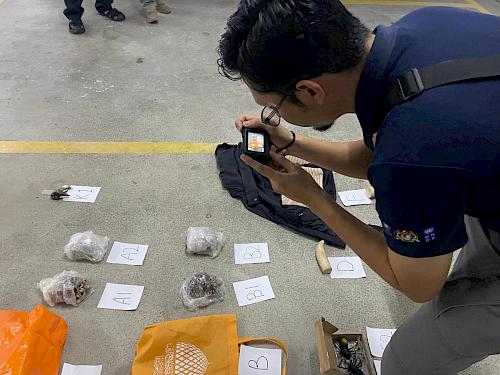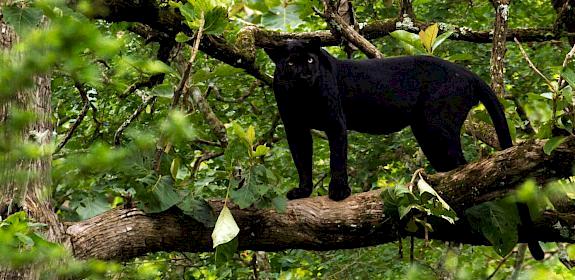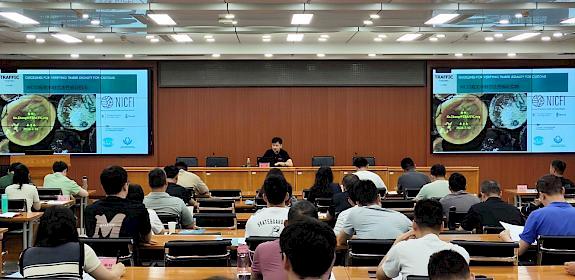Specialised training for improved investigations of wildlife crime in Malaysia
A syndicate supplying hundreds of tortoises to the international illegal trade, another network that snares, dismembers and sells tiger parts and over a thousand wildlife parts found near a national park.
These are just some of the recent wildlife crime cases Malaysian authorities have battled and the backdrop against which over two dozen enforcers were trained to investigate wildlife offences and secure stronger convictions.
The 26 participants of a specialised crime scene investigation workshop were drilled in managing suspects, sampling evidence, investigative techniques and processing crime scenes effectively.

Photo: Renee Yee / TRAFFIC
The workshop also included practical sessions in varied settings ensuring that participants gained hands-on experience similar to what they might encounter in the field.
The participants from Peninsular Malaysia’s Department of Wildlife and National Parks (PERHILITAN) and from the Wildlife Crime Bureau/Special Investigation Intelligence Unit of the Royal Malaysian Police were the first to receive such training under a U.S. Fish and Wildlife Service (USFWS) funded project* focused on equipping enforcement officers with the tools and knowledge necessary to tackle wildlife crime with an emphasis on tiger crime.
Malaysia’s Natural Resources and Environmental Sustainability Ministry recently informed the Malaysian Parliament that 490 offenders had been arrested in ramped up enforcement operations from 2019 to April this year.
Increased enforcement along with patrols and strengthening of wildlife laws are part of an intensified push to better protect the country’s less-than-150 wild tigers.
Greater enforcement effort has meant more investigations to dismantle organised criminal groups, not only covering tiger crime but an array of threatened species in illegal trade locally, and in cross-border trafficking.
The training was therefore designed to provide foundational information, and build competency and confidence in handling all stages of a wildlife crime investigation, including training on crime scene photography lead by the Technical Assistance Division of the Royal Malaysian Police Crime Investigation Department.
Modules were structured to enhance participants' ability to handle increasingly complex wildlife crime cases effectively, all with the ultimate objective of strengthening cases during prosecution to secure strong conviction outcomes.

One of Malaysia’s achievements has been increasing the jail terms and fines under the amendments to the Wildlife Conservation Act 2010, but it will have an impact on the work of enforcers. When fines go up to a million [Ringgit, or $225,000 USD] wildlife criminals aren’t likely to plead guilty."
Dato Abdul Kadir bin Abu Hashim, PERHILITAN Director General
“So, an arrest that is not well executed or an investigation that is incomplete will create loopholes through which criminals can escape the law,” Dato Abdul Kadir bin Abu Hashim told participants in his welcoming address to participants.
We recognise that this is not an easy task. The challenges increase when it reaches the prosecution stage, where defendants and their lawyers often look for opportunities or weaknesses to benefit their case."
Kanitha Krishnasamy, Director of TRAFFIC Southeast Asia.
Therefore, it is critical to reduce the gap between investigation and prosecution to ensure a strong and appropriate conviction,” she added. The workshop is an essential component of comprehensive efforts to disrupt tiger poaching and enhance conservation. Additional workshops will be organized in the future to further advance these critical initiatives
Notes:
* The Enforcement and Prosecution: Making a Case for the Malayan Tiger project is funded by the U.S. Fish and Wildlife Service (USFWS), It is a comprehensive program focused on equipping enforcement officers with the tools and knowledge necessary to tackle wildlife crime with the emphasis of tiger crime.
About US Fish and Wildlife Service

The U.S. Fish and Wildlife Service is a U.S. federal government agency within the U.S. Department of the Interior which oversees the conservation and management of fish, wildlife, plants and their habitats for the American people.





